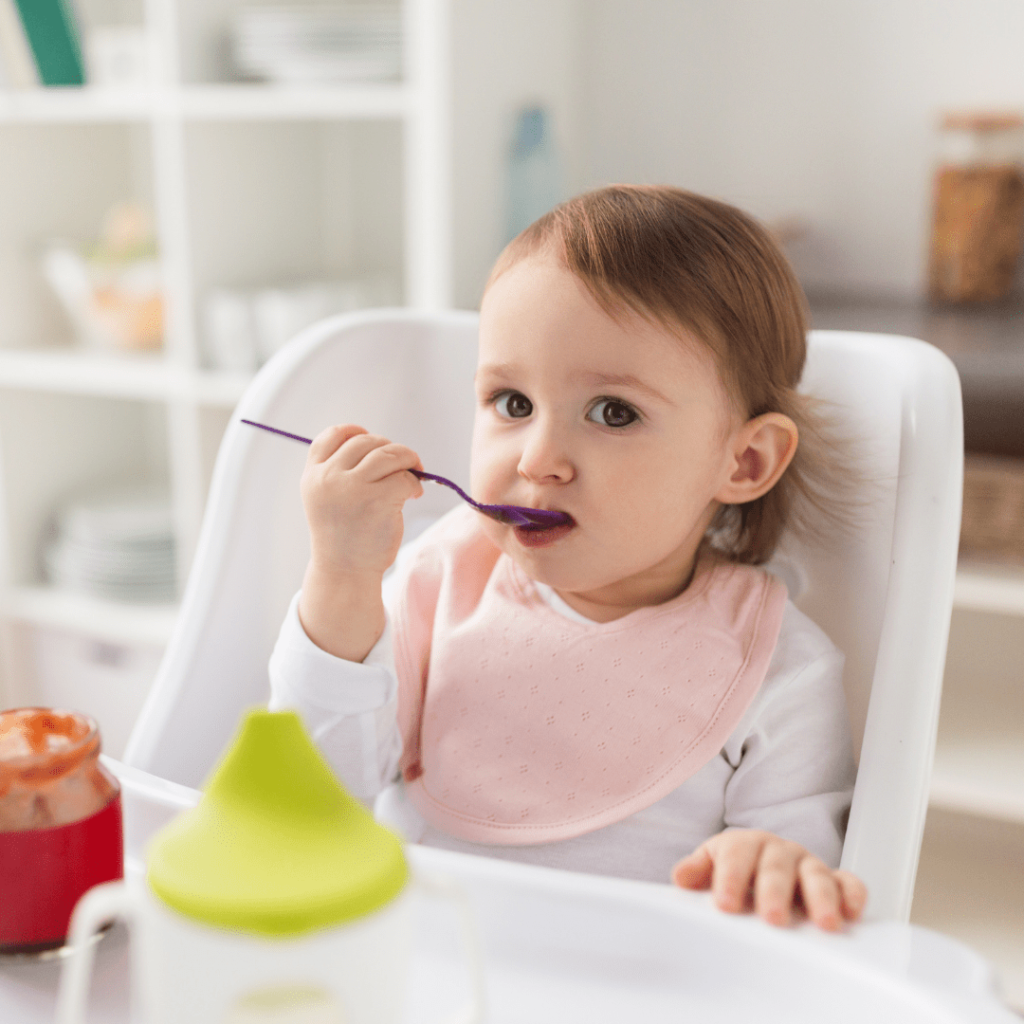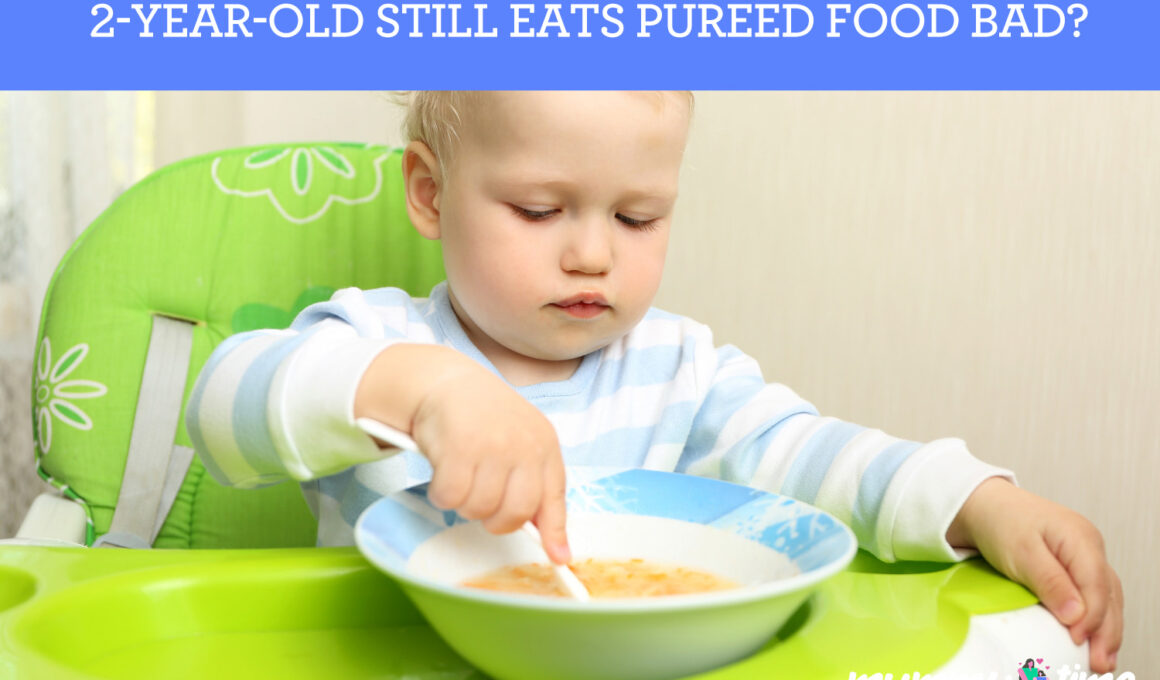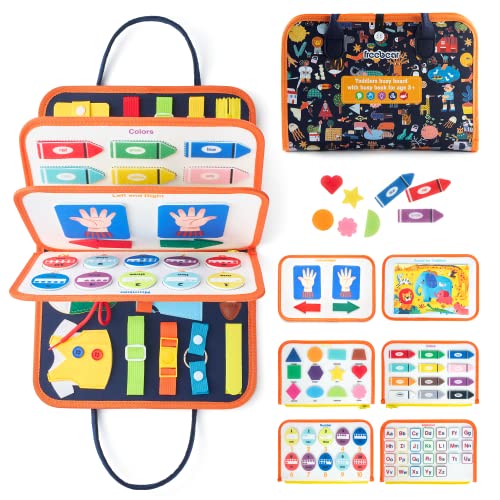In This Article Show
Typically, Infants are started on pureed food, but at 2 years old, your baby should be ready to become an active meal participant and while pureed food might have been natural addition and lifesaver to your kid’s diet, it might be time to switch things up.
As a 2-year-old child blossoms in social skills and language, so does the need to update their diet. Their diet should now include three healthy meals a day and do not forget to add 1 or 2 snacks. Toddlers’ appetites can vary from day to day; it is also common for them to be fussy with food or not eat at all.
It is best to integrate certain foods into your kid’s diet mindfully to not compromise their diet and taste preferences. Your 2-year-old can eat anything, so you simply have to ensure each meal is packed with nutritious food.
Quick answer: 2-year-old eating pureed food is not bad however it is unnecessary not to compromise their eating skills, and introduce them, slowly to solid foods. Adding pureed food to your baby’s diet around six months of age is great for introducing them to a world of tastes and textures. But at 2 years old, they should no longer drink from a bottle and be able to eat the same food as the rest of the family.
Pureed foods are also solid foods, but in this case, the texture has been modified, so there won’t be any need for chewing. Pureed foods are recommended for babies around 4 and 6 months but knowing when to stop is very important.
Pros And Cons Of Pureed Food
Pureed food which is also known as refined, is a method meant for people who have trouble chewing and is also useful for people with dysphagia or gastroparesis.
Great deals to snatch for your little ones 🎉
You can make any food or meal puree by simply blending it with an extra liquid such as water, broth, or juice hence it comes in handy for infants who can’t chew yet. Although this diet has some benefits, it does have some drawbacks as well.
| Pros | Cons |
|---|---|
| A puree diet requires eating more often, and meal plans have to be planned efficiently to ensure adequate nutrition | The nutritional value of pureed food may be lower than in regular food |
| It can help reduce the risk of choking or breathing foods into the lungs and developing pneumonia in the process | Remaining on this diet for long can be difficult as it is not exactly palatable, and texture can be a turn-off for many people |
| Pureed food is easier and faster to consume | Certain foods like nuts can be pureed, so they are exempted |
| It may offer slightly lesser calories than normal fruits since it is concentrated | Certain foods like nuts can be pureed so they are exempted |
| Pureed fruits can offer antioxidants that can help boost the immune system and limit damage to cells within the body. |
2-Year-Old Still Eats Pureed Food Bad?
Pureed food is unnecessary for your kid, and although they can go ahead and enjoy it when they are toddlers, as soon as he/she is one, it is recommended to start feeding them more regular food.
Most babies at 5 months or 6 are ready to try pureed food; however, feeding pureed food or solid to them at this age is based on their readiness and nutritional needs. So, while pureed food might come in handy for infants, it is not recommended for two years old.

It is time to transfer your 2-year-old that still eats pureed food to eating more regular food. Your baby can start eating regular food as soon as 6 months old and by the time by 2 years, your child should be able to eat different varieties of food from different food groups without fusing about it. It will be harder for your 2-year-old child to like vegetables in their whole form when they are used to pureed foods.
Babies around 12 and 18 months are likely going to show interest in table food, so it is time to start introducing solid food to your baby to provide them with more nutrients for their growing brain and body. So, while pureed food is not bad for your 2-year-old, it does have drawbacks in nutrients, taste, and texture.
How to Transition To Solid Foods If Your Baby is Stuck on Purees
It might be time to transfer your baby to solid foods and to do this, you have to start with a slow gradual process and stage to make it easier.
The easiest type of food to introduce to your baby following pureed food is finger foods, which include avocado, slices, sweet potato, banana, or cooked veggies which do not require utensils to eat and will promote self-feeding in the process.
It can be quite tricky to know when your baby is ready to eat regular food, it is common for toddlers to be fussy about food or not eat at all which is why pureed food has been considered more friendly and less messy. However, pureed foods are lower in fiber than whole foods. Here are tips on how to transition to solid foods.
- Serve soft foods mashed with a fork, easily melt in their mouth, or can be easily gummed
- Feed your baby what is on your plate (follow foods safety measures)
- Let your baby explore food from different food categories
- Place small pieces of soft solid food on the sides of your baby’s mouth to promote better chewing and tongue movement
- Offer foods that are cured into long strips to enable them to pick up themselves
- Alternate between bites of textured food with bites of smooth food when you offer foods with increased texture
- Show them the chewing motion, so they can imitate it.
Wrapping Up
There is no specific age or time you are meant to start feeding solid to your baby but to enable your baby to avoid the many issues that come with feeding, you can switch to finger foods while they get comfortable trying out more regular food.
It is best that pureed food is phased out and solid is introduced as soon as your baby can move food from the front of the mouth to swallow it.
Lastly, moving your child from pureed food to regular food will require lots of patience, as toddlers can be quite willful. You need to put in the work and offer them a more balanced diet that consists of solid foods and not just convenient foods.
Keep reading:













